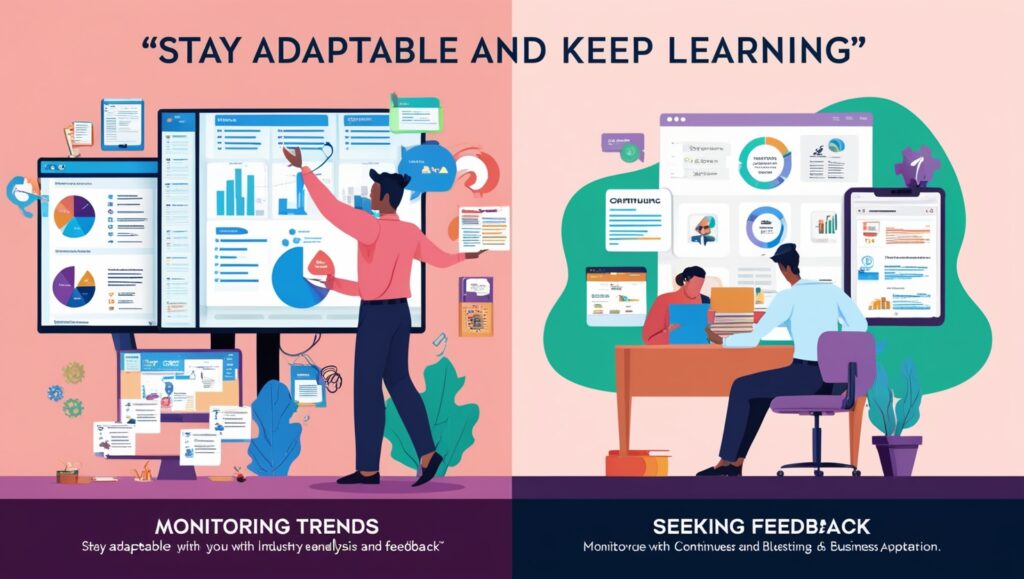Starting a business is an exciting journey, but it can also be a daunting one. Whether you’re full of ideas or just beginning to explore entrepreneurship, knowing the steps to success is crucial. In this article, we will dive into 7 tips for a successful business, offering you a roadmap to follow, along with some helpful insights and successful business guides. By the end, you’ll feel more confident about how to start a business that thrives.
Step 1: Develop a Strong Business Idea

Everything begins with an idea. This may seem obvious, but too often, people rush into starting a business without fully fleshing out what they want to do. A successful business starts with a well-thought-out concept that addresses a need or solves a problem for a particular audience. This is the foundation of how to start a business.
Ask yourself:
- What problem does my product or service solve?
- Is there a demand for it?
- Who is my target audience?
- Can my business idea stand out from competitors?
For example, if you’re opening a coffee shop, your business idea shouldn’t just be “to sell coffee.” Consider what makes your coffee shop unique—maybe you focus on sustainably sourced beans, or perhaps your shop fosters a community atmosphere with events and live music.
Researching your competitors and your target market is critical at this stage. By doing so, you can refine your concept and ensure that you’re entering a market where your business idea is needed. This is the first of the 7 tips for a successful business: make sure your business idea is solid and backed by research.
Step 2: Create a Detailed Business Plan
Once you have a strong idea, it’s time to map out how you will turn that idea into a reality. A business plan is your roadmap, and it is essential for how to start a business successfully. It doesn’t need to be overly complicated, but it should include certain key elements like:
- A description of your business and your goals
- A breakdown of your target audience and marketing plan
- An outline of your products or services
- A financial plan, including startup costs, revenue projections, and pricing strategies
- Any potential challenges you anticipate and your strategies for overcoming them
Not only will a business plan guide you, but it can also be instrumental in securing funding from investors or lenders. Successful business guides always stress the importance of a clear, actionable business plan. It’s not just about having a vision; it’s about knowing exactly how to execute it.
Step 3: Manage Your Finances Wisely

Financial management is one of the most important aspects of running a successful business. Whether you’re bootstrapping or seeking outside investment, how you handle money can make or break your company. Knowing how to start a business is just one part of the equation—you need to ensure your business is financially viable over the long term.
Here are some financial tips for a successful business:
- Keep your personal and business finances separate. Open a business bank account and get a business credit card.
- Track all expenses, from startup costs to daily operating expenses.
- Budget realistically and be conservative with your estimates. It’s better to underestimate your revenue than to overestimate.
- Stay on top of your cash flow. Cash flow problems are one of the main reasons why small businesses fail.
If you’re unsure how to manage your finances, it’s worth consulting a financial advisor or accountant who specializes in small businesses. These professionals can help you with everything from taxes to setting up accounting systems, giving you peace of mind and helping you maintain financial health.
Step 4: Focus on Building a Strong Brand
Branding is about more than just a logo or a catchy slogan. It’s the identity of your business, how you communicate with customers, and what sets you apart from the competition. A strong brand will resonate with your audience and build trust, which is crucial for any successful business.
When you think about how to start a business, branding might not be the first thing that comes to mind, but it’s essential for long-term success. A well-defined brand can:
- Help you attract your target audience
- Create customer loyalty
- Differentiate your business from competitors
Here are some ways to build a strong brand:
- Identify your business’s core values and ensure these are communicated consistently across all platforms, from your website to social media.
- Develop a unique visual identity, including a logo, color scheme, and typography that reflects your business’s personality.
- Establish a consistent voice in all your communications, whether you’re writing a blog post, social media update, or customer email.
Your brand is your business’s reputation. Invest time and resources into it, and you’ll create a solid foundation for future growth.
Step 5: Market Your Business Effectively

You’ve got a great product or service, but without marketing, no one will know about it. Effective marketing is crucial to attracting customers and driving sales. When considering how to start a business, think about how you will reach your target audience.
Here are some tried-and-true marketing strategies:
- Social media marketing: Platforms like Instagram, Facebook, and Twitter allow you to connect with your audience and showcase your products or services. If your business targets younger audiences, TikTok and YouTube may also be great platforms.
- Content marketing: Blogs, videos, and other content can help educate your audience and establish your business as an authority in your industry.
- Email marketing: Building an email list allows you to communicate directly with potential and existing customers, keeping them updated on new products, promotions, and more.
- Search engine optimization (SEO): By optimizing your website for search engines, you can attract more organic traffic and rank higher for relevant keywords.
Marketing requires time, effort, and often a bit of experimentation. Different strategies will work for different businesses, so be prepared to adapt and change as you learn more about what resonates with your audience.
Step 6: Provide Excellent Customer Service

No matter how good your product or service is, it’s the experience you provide to your customers that will determine whether they return. A successful business knows that customer satisfaction is key to long-term success. Happy customers become repeat customers, and they also recommend your business to others.
Here are some ways to provide excellent customer service:
- Be responsive. Whether customers are reaching out on social media, via email, or over the phone, they expect a timely response.
- Go the extra mile. Show your customers that you value them by doing something unexpected—whether it’s offering a personalized thank-you note or providing a discount for their next purchase.
- Handle complaints gracefully. Not every customer interaction will be perfect, but how you respond to a negative experience can make all the difference. Listen to customer feedback and take steps to resolve any issues.
- Train your staff. If you have employees, make sure they understand the importance of good customer service and are trained to handle various situations professionally.
Customer service can make or break a business, so take the time to build relationships with your customers and make their experience as positive as possible.
Step 7: Stay Adaptable and Keep Learning

One of the final, but equally important, 7 tips for a successful business is to stay flexible. The business landscape is always changing, and as an entrepreneur, you must be willing to learn, adapt, and evolve. New technologies, customer trends, and economic conditions can affect your business, and being prepared to pivot can make a significant difference in your success.
Here are some ways to stay adaptable:
- Monitor trends: Keep an eye on what’s happening in your industry and be ready to adjust your products, services, or marketing strategies accordingly.
- Seek feedback: Regularly ask for feedback from customers and employees to identify areas for improvement.
- Continue learning: Invest in your own education by attending workshops, reading books, or taking courses. The more you know, the better prepared you’ll be to handle challenges.
Many successful business guides emphasize that the journey to success is rarely linear. It’s full of ups and downs, and the ability to learn from mistakes and adjust course is critical. Staying humble and open to new ideas will keep you ahead of the competition.
Bonus Tips: Leverage Online Systems for more Success

In today’s digital age, having a strong online presence is critical for running a successful business. Whether you’re selling products or offering services, integrating an online system can streamline operations, expand your reach, and improve customer experience. Understanding how to start a business in the modern era means utilizing the power of the internet to your advantage.
Here’s how to leverage online systems for business success:
- Create a user-friendly website: Your website is often the first point of contact for customers. Make sure it’s professional, easy to navigate, and mobile-friendly.
- Use e-commerce platforms: For product-based businesses, platforms like Shopify or WooCommerce make it easy to manage orders, track inventory, and process payments securely.
- Automate tasks: Use tools like email marketing automation, chatbots for customer service, and accounting software to handle routine tasks efficiently, freeing up your time to focus on growing your business.
- Social media and SEO: Engage with customers on social media, and use SEO strategies to ensure your business is visible online when potential customers search for relevant products or services.
Online systems help you stay competitive, scale faster, and offer better service—making them indispensable for a successful business in today’s world.
Conclusion
Starting and running a business takes more than just passion—it requires careful planning, financial management, strategic marketing, and a strong focus on customer satisfaction. By following these 7 tips for a successful business, you’ll be well on your way to creating a thriving company.
To recap:
- Develop a strong business idea.
- Create a detailed business plan.
- Manage your finances wisely.
- Focus on building a strong brand.
- Market your business effectively.
- Provide excellent customer service.
- Stay adaptable and keep learning.
- Leverage Online Systems for Success
With these successful business guides in hand, you now have a clearer understanding of how to start a business and make it succeed. Remember, entrepreneurship is a journey, and every step you take brings you closer to achieving your dreams. Stay focused, stay committed, and success will follow!
